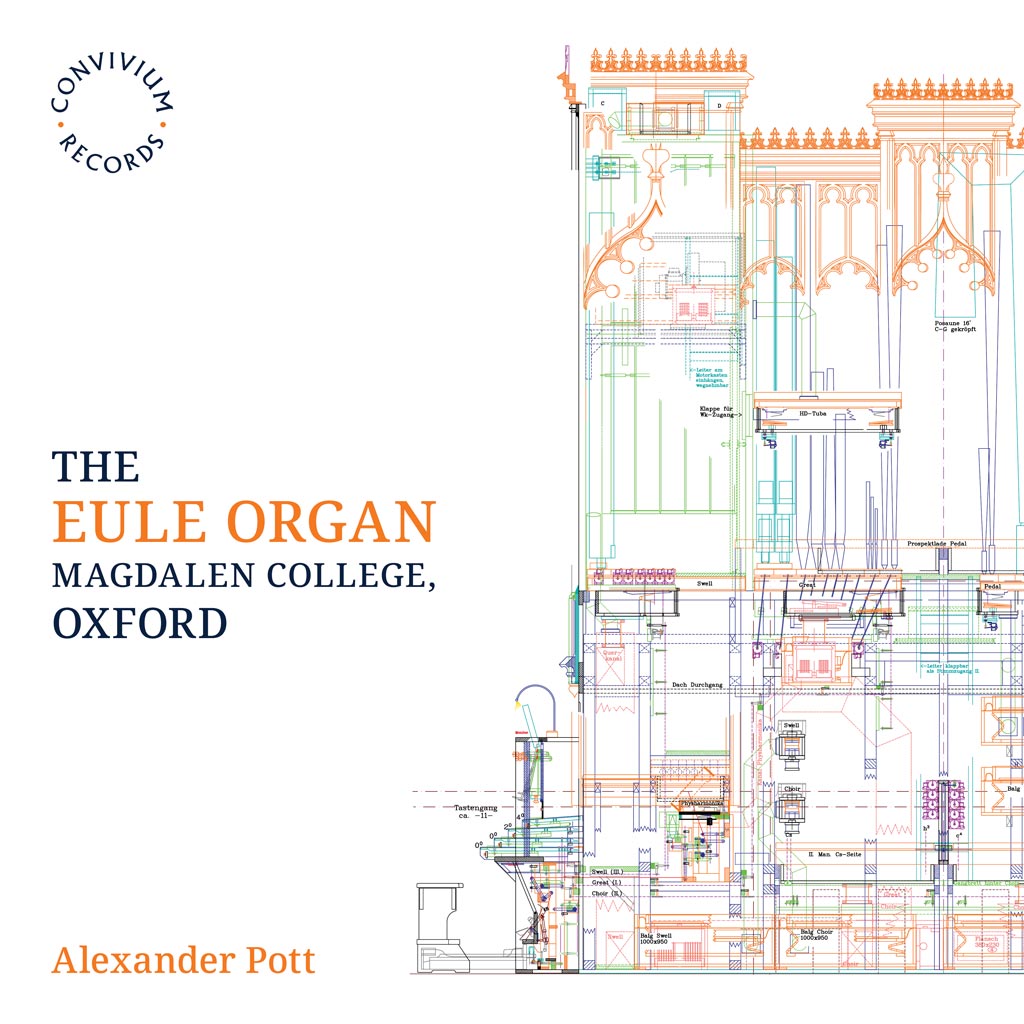The Eule Organ of Magdalen College, Oxford – Review by BBC Music Magazine
"Alexander Pott's programme note makes many intriguing connections borne out by his performances of composers. Oxford's new organ... is worth celebrating on this recording." ★★★★
1st November 2025
The Eule Organ of Magdalen College, Oxford – Review by BBC Music Magazine
"Alexander Pott's programme note makes many intriguing connections borne out by his performances of composers. Oxford's new organ... is worth celebrating on this recording." ★★★★
1st November 2025

Listen or buy this album:
Under the heading of ‘Anglo-Saxony’, the organist Alexander Pott’s programme note makes many intriguing connections borne out by his performances of composers – mostly German and English – drawn to Leipzig and Dresden. Also included are a few composers influenced by them, but underlying all these connections is the organ of Magdalen College itself: built by the firm of Hermann Eule, established in the German town of Bautzen in 1872 Oxford’s new organ was installed 150 years later and is worth celebrating on this recording.
Liszt’s ‘Funérailles’ (transcribed by Jeanne Demessieux) makes a fitting start, its glowering textures showcasing an organ whose colours are further revealed in Pott’s virtuosic performance of the Liszt arrangement of ‘Pilgrim’s Chorus’ from Tannhaüser.
Central to the assortment of other composers here, Carl Reinecke often gets a bad rap, not least from his one-time student Ethel Smyth, whose own Prelude and Fugue on O Traurigkeit, O Herzeleid hardly sets the pulses racing; Reinecke’s Sonata in G minor Op. 284 emerges more warm, especially in its magnificent finale based on the Epiphany choral Wie schön leuchtet Der Morgenstern. A lovely miniature from Sigfrid Karg-Elert belies his rather heavy reputation and spotlights a rare stop, the Physharmonica.
Another Reinecke student in Leipzig, Frederick Delius is the programme’s secondary axis, drawing together Percy Grainger, Percy Whitlock (in Pott’s effective arrangements of his five Folk-Song Preludes) and Frederic Austin. Baritone turned composer, Austin is especially welcome since his rhapsodic Organ Sonata in G receives its premiere recording here.
Review written by:
Review published in:
Other reviews by this author:
No other reviews found
Under the heading of ‘Anglo-Saxony’, the organist Alexander Pott’s programme note makes many intriguing connections borne out by his performances of composers – mostly German and English – drawn to Leipzig and Dresden. Also included are a few composers influenced by them, but underlying all these connections is the organ of Magdalen College itself: built by the firm of Hermann Eule, established in the German town of Bautzen in 1872 Oxford’s new organ was installed 150 years later and is worth celebrating on this recording.
Liszt’s ‘Funérailles’ (transcribed by Jeanne Demessieux) makes a fitting start, its glowering textures showcasing an organ whose colours are further revealed in Pott’s virtuosic performance of the Liszt arrangement of ‘Pilgrim’s Chorus’ from Tannhaüser.
Central to the assortment of other composers here, Carl Reinecke often gets a bad rap, not least from his one-time student Ethel Smyth, whose own Prelude and Fugue on O Traurigkeit, O Herzeleid hardly sets the pulses racing; Reinecke’s Sonata in G minor Op. 284 emerges more warm, especially in its magnificent finale based on the Epiphany choral Wie schön leuchtet Der Morgenstern. A lovely miniature from Sigfrid Karg-Elert belies his rather heavy reputation and spotlights a rare stop, the Physharmonica.
Another Reinecke student in Leipzig, Frederick Delius is the programme’s secondary axis, drawing together Percy Grainger, Percy Whitlock (in Pott’s effective arrangements of his five Folk-Song Preludes) and Frederic Austin. Baritone turned composer, Austin is especially welcome since his rhapsodic Organ Sonata in G receives its premiere recording here.
Review written by:
Review published in:
Other reviews by this author:
No other reviews found